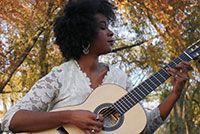Why study music?
Are you passionate about performing and creating music? Music is an integral component of life and culture and is part of our shared human experience. Studying music at Parkland College is a great way to pursue your goals with instruction from skilled musicians.
The skills learned as a trained musician are transferable and will help you succeed in all areas of life. You’ll learn discipline, organization, collaboration, and time management while mastering your musical abilities.
Completing a degree in music can prepare you for careers in a variety of fields. These include performance, education, arts administration, music business, community arts management, events manager, and music therapy. See the Bureau of Labor Statistics for average annual salaries for musicians and careers in music.
Music Program Scholarship

50% tuition and fees scholarship available. Learn more on the AMSS Scholarships page.
"Parkland's Music Scholarship enabled me to focus on achieving my academic goals. I am becoming more confident in myself as a musician and I am looking forward to how I will grow beyond Parkland."
— Briana Sykes
Classes
Parkland College offers a variety of music classes to prepare you for an advanced degree or to fulfill general education requirements.